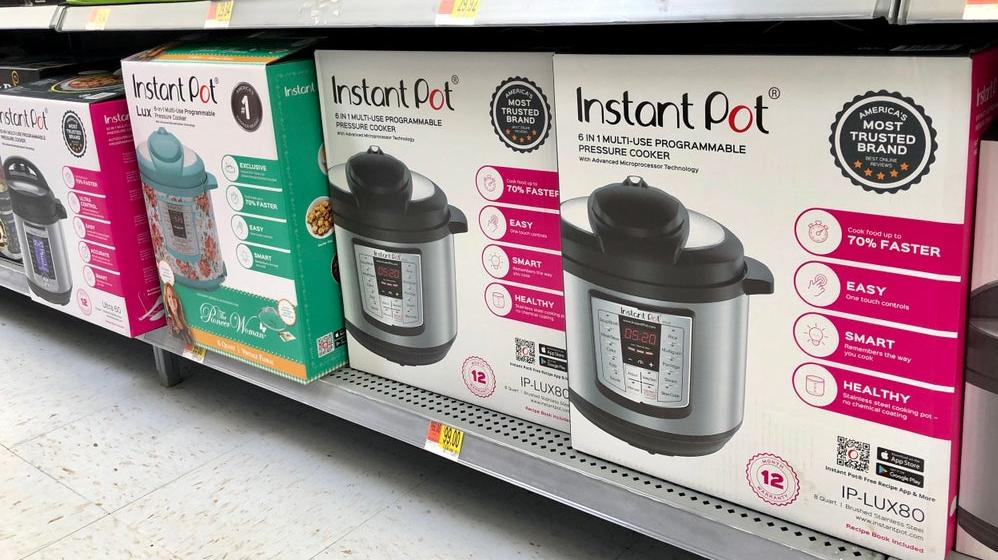Instant Pot Doesn't Deserve This
The all-in-one kitchen appliance has been crushed, in part, by the forces of capitalism.
One of the most ubiquitous kitchen gadgets of our time is in trouble—and while it might not meet its demise entirely, it's going to take some work to it get back on track. The Wall Street Journal reports that Instant Brands, parent company of the Instant Pot, filed for bankruptcy Monday. Though it would be easy to blame this all on a decline in sales, there's a bit more to the story.
The kitchen appliance maker listed more than $500 million in both assets and liabilities in its Chapter 11 bankruptcy filing. The company is attempting to figure out a path forward and, in the meantime, has secured $132.5 million in financing from existing lenders to carry it through the bankruptcy process. How could a brand so beloved fall so far?
Why the Instant Pot failed
Back in January, WSJ reported Instant Brands had hired "restructuring advisers" to help the company address financial challenges that came as a result of "consumers who tightened their discretionary spending in the face of inflation." That plan apparently didn't lead to greater success; come March, WSJ was reporting that Instant Pot sales were tanking and the brand was looking for a new hit product to keep the company afloat. Here lies an issue more complicated than declining sales, which WSJ notes as being down 21.9% in the first quarter this year compared with the same period in 2022.
As a product, the Instant Pot is a triumph of the kitchen category. From rice to ribs to cheesecake to pork chile verde, there's not much you can't cook using this appliance—that's the point of it. Not only is it optimized for cooking set-it-and-forget-it meals, but it also cooks such meals at a much faster pace than the antiquated Crock-Pot (absolutely no disrespect to the Instant Pot's ancestor). Taken together, these features made the Instant Pot a perfect appliance for a pre-pandemic world in which busy people left their homes to commute to work or run errands; many of us came to rely on the Instant Pot to cook food quickly without much intervention.
However, in 2023, and the few years preceding it, the work-from-home lifestyle has gained traction (for obvious reasons), leading to less demand for set-it-and-forget-it cooking methods. Remember when we all became chefs in quarantine?
That lack of demand led Instant Pot to cancel $100 million worth of orders from retailers in 2021. And instead of working on ways to make its star product more relevant and future-proof, Instant Brands, after being purchased in 2019 by private equity firm Cornell Capital LLC, owner of Pyrex, Snapware, and other kitchen products, focused its efforts squarely on further growth.
Ben Gadbois, president and CEO of Instant Brands, described the Instant Pot to WSJ as a landmark product, but conceded that when it comes to such category leaders, "ultimately, eventually they slow down." Gadbois pushed for the launch of new products under the Instant Brands label, such as an electric Dutch oven, stand mixer, and coffee maker, as well as a new Instant Pot design to inspire consumers to replace their current one with the latest model.
Instant Brands has tried to take the pressure off (heh heh) its one-pot wonder by trying to infiltrate every other corner of the kitchen and keep up with other kitchen tech brands like SharkNinja, even going so far as to release its own version of the mighty air fryer in 2019 and 2020. Ultimately, the company was a bit late to the party on that one. The air fryer's value persists, but its soaring adoption rate couldn't possibly continue upward for every brand that released one.
"Ninja was always the Pepsi to our Coke," Mike Scheffki, who worked in marketing at kitchenware company Corelle before and after it acquired Instant Brands, told WSJ in March. "Lots of time and resources went towards playing catch-up and how do we rekindle the magic."
"We believe that the Instant Pot product is going to be around for a long, long, long time, and we still sell a lot of volume," Gadbois said. "But no product stays at a phenom level forever."
Maybe Instant Brands does need a new big hit product to keep the company going, or maybe it would be better off investing in the appliance that started it all without expecting unlimited growth from it. Either way, the company needs to figure out a strategy soon, because it looks like burning the candle at both ends is not getting it anywhere good.
Although my Instant Pot is currently gathering dust on top of my refrigerator, the next time I need to make a meal to feed a party larger than just myself, I can't say it won't get dusted off and put to use.
